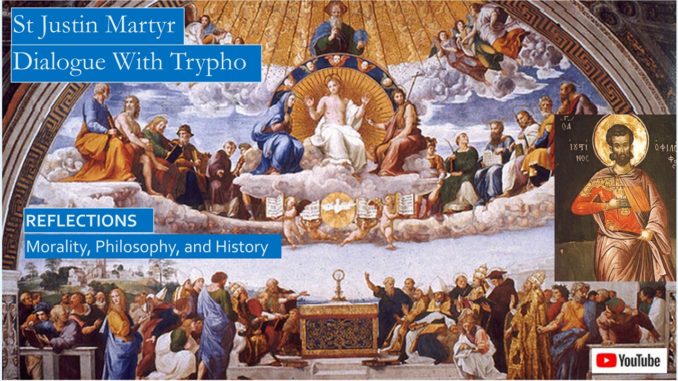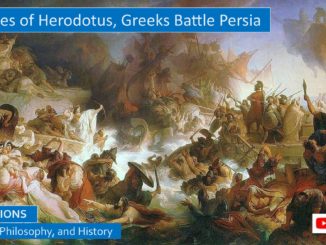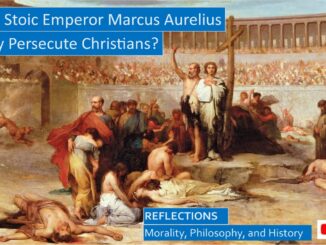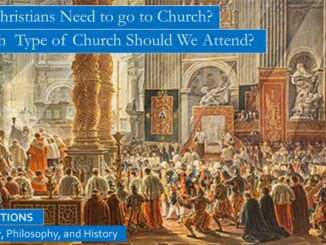
St Justin Martyr’s Dialogue With Trypho is likely based on a real discussion with a philosopher-rabbi, their discussions and debates sound plausible and are internally consistent, and in the end Trypho is not convinced sufficiently to convert, but they agree to disagree and pledge to continue the conversation at the end of the dialogue. We covered the portion of the dialogue where they discuss how moral philosophy can promote a life of faith in the Judaeo-Christian tradition:
http://www.seekingvirtueandwisdom.com/st-justin-martyr-dialogue-with-trypho-blog-3-justin-is-converted/
Please view our YouTube video at: https://youtu.be/AafwB0tA5a8
YouTube script with book links: https://www.slideshare.net/BruceStrom1/st-justin-martyrs-dialogue-with-trypho-a-jew-on-circumcision-jesus-and-philosophy
We recommend that you purchase the Ante-Nicene Fathers eBooks from https://www.christianbook.com/.
JEWISH AND CHRISTIAN VIEWS ON CIRCUMCISION
When the debate begins, the first question Trypho asks is about circumcision, which was a major stumbling block for Christian converts in the early days of the Church, when many converts were confused on whether they first needed to convert to Judaism before becoming Christian. Converting to Judaism meant you had to be circumcised. St Paul in his Epistles famously reassures his Gentile converts that they only needed to be circumcised in their heart. Not only did Christian converts not need to be circumcised; it was wrong to require that converts be circumcised, and he is quite strident in his exhortations in Galatians in particular.
Why was circumcision such a critical issue for both Jews and Christians in the early Church? In Judaism, circumcision was a sign that Jews professed the Covenant between the Lord and His people Israel, the Covenant sealed at Mt Sinai with the giving of the Decalogue and the Law. This puzzling verse in Exodus emphasizes how critical it was to circumcise by the eighth day all Jewish newborn sons. Moses had been selected by the Lord to deliver his people from the hands of Pharaoh, and was even given instructions from the Lord, but he had not yet circumcised his son that his Midianite wife, Zipporah, had born him.
So suddenly, this happens: “At a lodging place on the way the Lord met Moses and sought to kill him. Then Zipporah took a flint and cut off her son’s foreskin, and touched Moses’ feet with it, and said, ‘Surely you are a bridegroom of blood to me!’ So, he let him alone. Then it was that she said, ‘You are a bridegroom of blood’ because of the circumcision.”[1]
Sought to kill him? The footnotes in the Rashi commentary note that though most Talmudic rabbis think that this refers to Moses, some posit that perhaps the Lord is seeking to kill the child. St Augustine also notes that this ambiguity exists in the Latin Scriptures he reads from. Similarly, the Hebrew states that Zipporah threw the foreskin at “his feet,” which means that though most rabbis think this means she threw the foreskin at Moses’ feet, some Talmudic rabbis posit she could have thrown it at her son’s feet, or at the angel’s feet.[2]
St Augustine considered circumcision to be a sacrament of the Old Law. In the following quote, St Augustine posits that the angel would have killed the son had he not been circumcised. St Augustine teaches us, “If I had been a Jew in the times of the ancient people,” “I would have surely accepted circumcision. That ‘seal of justice of the faith’ (Romans 4:11) had so much power at the time, before it was rendered void by the coming of the Lord, that the angel would have strangled the infant son of Moses if his mother had not taken up a stone and circumcised the child, and thus by this sacrament warded off his imminent destruction.” “The Lord Himself received this sacrament after birth, although on the cross He made it void.”[3]
Circumcision was also incredibly painful, and for a few days, quite debilitating. The sons of Judah took advantage of this when took revenge on a neighboring king when he committed what we today would call date rape with their sister, Dinah. Genesis related that when King Shechem “saw their sister Dinah, he seized her and lay with her by force. And his soul was drawn to Dinah, daughter of Jacob; he loved the girl and spoke tenderly to her. Shechem spoke to his father Hamor, saying, ‘Get me this girl to be my wife.’ ”
How did the sons of Jacob, brothers of Dinah, respond to this proposal that would join their two tribes together as a result of the lust turned love? Genesis tells us that “The sons of Jacob answered Shechem and his father Hamor deceitfully, because he had defiled their sister Dinah. Only on this condition will they agree to live among us, to become one people: that every male among us be circumcised as they are circumcised.”
So what happened then? What happened was what always happened in the ancient world, when you defeat a city who is hostile towards you, you slaughter all the men, enslave the women and children, and load the rest on camels. “On the third day, when the men of Shechem were still in pain, two of the sons of Jacob, Simeon and Levi, Dinah’s brothers, took their swords and came against the city unawares, and killed all the males.” “All their wealth, all their little ones and their wives, all that was in the houses, they captured and made their prey.”[4]
Their father Jacob was not happy with his hasty slaughter. His sons simply asked him, “Should he treat our sister as a harlot?” Later, on his deathbed, he would curse some of his sons for this slaughter and act of hubris.
This story in Genesis proves that circumcision was painful indeed. Men can barely walk and surely cannot yield a sword shortly after their circumcision.
GREEK VIEWS ON CIRCUMCISION
Hellenic and Roman culture celebrated nudity for not only male athletes, but all active males who frequented the public baths and gymnasiums. Baths and gymnasiums were social clubs more than they were athletic clubs, these facilities were meeting places as well as exercise facilities.
But men were not totally nude if they were not circumcised, and no Greek citizen would ever consent to circumcision, because then your mushroom (or glans) would show, and that was considered very vulgar and really naked and shameful. Being circumcised was so socially isolating that many Jews tried to cut off as little skin as possible so their sons could appear to be both Jew and Greek. There was even a semi-surgical procedure to reverse circumcision, term epispasm, that would entice skin to stretch over the mushroom. Rabbis were so concerned about this procedure that they proclaimed that epispasm was a sin that could never be atoned at Yom Kippur, unless it were undone.[5]
These cultural norms explain why the early Christian Church would have been crippled in its efforts to evangelize to Gentile converts if it had required them to undergo circumcision, and makes it easier to understand why the first church council was called in Jerusalem in Acts 15 primarily over this question about circumcision.
TRYPHO ASKS JUSTIN WHY CHRISTIAN CONVERTS ARE NOT CIRCUMCISED
Trypho asks Justin why Christians, “who profess to be pious and suppose they are better than others,” do not observe the Jewish festivals or sabbaths, or require that converts be circumcised. Trypho asks Justin, “Have you not read that the Lord will cut off the soul from His people who shall not have been circumcised on the eighth day.”(Chapter X) In the Jewish Torah, a Jewish son shall be circumcised on the eighth day after his birth, St Justin sees this as a sign of Jesus resurrecting from the dead on the eighth day of the week, or Sunday.
To the best of my knowledge there were no early Church Fathers who spoke about observing the Jewish festival calendar, though there were many who emphatically discouraged Christians from attending Jewish festivals. The early church quickly developed its own calendar of festivals remembering the saints and church history.
When answering Trypho, St Justin first emphasizes that there is only one God, and that this one God is God of both the Jews and the Christians. St Justin affirms this when he responds that there is not “one God for us, another for you, but that He alone is God who led your fathers out from Egypt with a strong hand and a might arm.”
St Justin answers Trypho in a manner that many Christians would adopt, he responds that the new Covenant under Christ replaces the old Covenant of the Law. St Justin says, “the law promulgated on Mt Horeb is now old, and belongs to you alone,” that the old law has been abrogated by the coming of Christ, who is the “eternal and final law.” He quotes Jeremiah, “Behold, the days come, says the Lord, that I will make a new covenant with the house of Israel and with the house of Judah, not according to the covenant which I made with their fathers.” “Christ is the new Law, and the new covenant, and the expectations of those who out of every people wait for the good things of God.” The true spiritual Israel includes all people, including Jews, “who have been led to God through the crucified Christ.” (Chapter XI)
St Justin summarizes his arguments in his subheadings for Chapter XIII, “Isaiah teaches that sins are forgiven through Christ’s blood,” and for Chapter XIV, “Righteousness is not placed in Jewish rites, but in the conversion of the heart given by baptism by Christ.”
The hatefulness of Nazism and the still vivid memories of the Holocaust color our interpretation of both Scripture and the Church Fathers, as indeed it should. So the subheads for Chapter XVI makes us pause: “Circumcision is given as a sign, that the Jews might be driven away for their evil deeds done to Christ and the Christians,” and for Chapter XII, “The Jews spread calumnies on the Christians through the whole earth,” and for Chapter XXVI, There is “no salvation for the Jews except through Christ.” The question of anti-Semitism in the early Church writings is a valid question, we plan to address this question in a future set of blogs and videos.
St Justin quotes Jeremiah when he says, “circumcise yourselves to the Lord, and circumcise the foreskin of your heart.”(Chapter XXVIII) “The Christian’s Circumcision is more excellent.” “The blood of the old circumcision is obsolete, and we now trust in the blood of salvation; there is now another covenant, and another law has gone forth from Zion.”(Chapter XXIV)
Likewise, the Passover Lamb points to the coming of Christ. St Justin teaches us, “The mystery of the lamb which God enjoined to be sacrificed as the Passover was a type of Christ; with whose blood, in proportion to their faith in Him, they anoint their houses, and themselves, who believe in Him.”(Chapter XL)[6]
Trypho asks other questions which St Justin answers, such as why Christ was not dishonored and shamed when he was crucified, why some Christian eat meat offered to idols, and whether the Messiah would be born from a virgin or a young woman, and we invite you to read St Justin for his answers to many of these classic questions.
These are the other two blogs on the writings of St Justin the Martyr:
http://www.seekingvirtueandwisdom.com/st-justin-martyr-blog-1-first-apology-to-the-emperor-2/
http://www.seekingvirtueandwisdom.com/justin-martyr-second-apology-and-socrates/
[1] https://www.biblegateway.com/passage/?search=exodus+4%3A24-26&version=RSVCE
[2] Rashi, The Metsudah Chumash, Shemos (Exodus), translated by Rabbi Avrohom Davis (Brooklyn, NY: Israel Book Shop, 2005, originally written around 1100 AD), pp. 42-44
[3] Ancient Christian Commentary, Old Testament, Volume 3, Exodus (Downers Grove, IL: Intervarsity Press, 2001), pp. 31-33.
[4] https://www.biblegateway.com/passage/?search=genesis+34&version=RSVCE
[5] Several articles in the Bible Review and Biblical Archaeology magazines discuss why circumcision was such an issue in Hellenic culture. These niche magazines are early internet victims, but back issues are available online for a modest annual fee. https://www.baslibrary.org/bible-review/8/4/19 , https://www.baslibrary.org/biblical-archaeology-review/32/4/9 , https://www.baslibrary.org/bible-review/7/1/8
[6] St Justin Martyr, Dialogue With Trypho, In the Ante-Nicene Fathers, Volume 1, translated by Dods and Reith (Boston: Hendrickson Publishers, 1994, first published 1885), pp. 194-272.




2 Trackbacks / Pingbacks